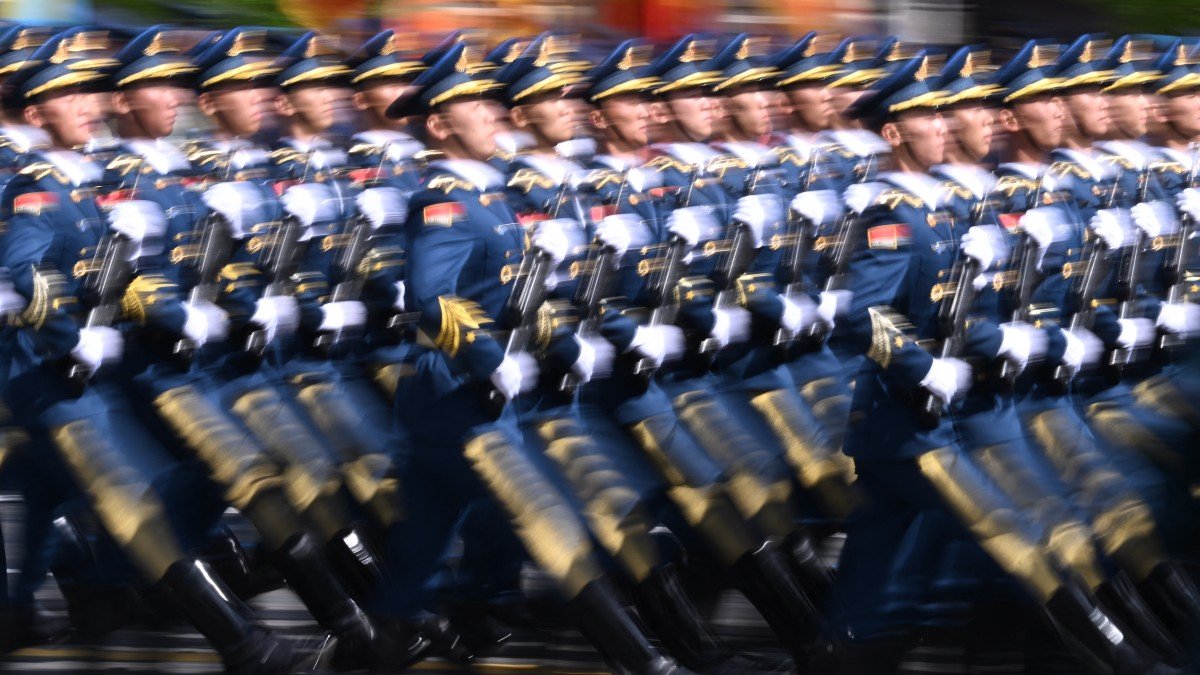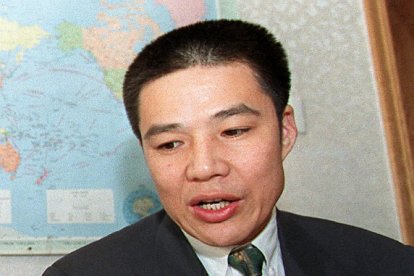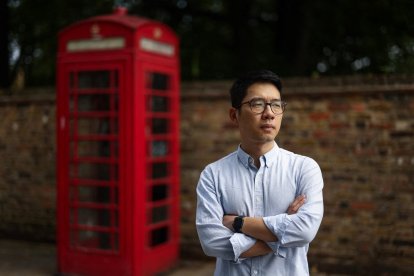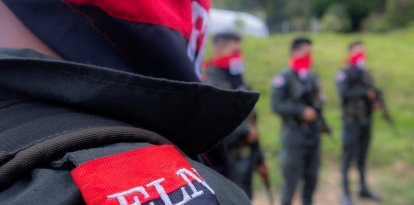ANALYSIS
Under the Shadow of the Dragon: How China Silences and Crushes its Dissidents Abroad
Such a reality, such a proclivity for repressing dissent at home and abroad, represents a maelstrom of fear and espionage that conceals a contradiction as dangerous as it is unusual.

Chinese servicemen march on Red Square during the Victory Day military parade in central Moscow.
In April 2023, the FBI arrested two Chinese nationals in New York City after determining that both were part of a clandestine station that the China had set up in the Big Apple to conduct intelligence operations in the heart of the United States. While the news was surprising, realizing just how far China is willing to go in its race against the American hegemon, what was sordidly chilling was the detail revealed by the FBI about the main purpose of that station: To monitor and intimidate the Chinese diaspora in this city, pursue and intimidate dissidents who dare to be part of that courageous activism responsible for denouncing the atrocities committed by a dictatorship that silences and crushes.
Far from being an isolated case, authorities and journalists from different parts of the world have been reporting over the last few years that the regime of Xi Jinping has installed more than 100 clandestine stations across the geopolitical map for the same purposes. Such a reality, such a proclivity for repressing dissidence inside and outside its borders, represents awhirlpool of fear and espionage that hides a contradiction as dangerous as it is unusual: the fact that all this is widely known and at the same time ignored by locals and outsiders alike.
Over the past decades, it has become evident how the Chinese regime has repressed thousands of dissidents abroad through the use of sophisticated tactics whose ultimate goal is to silence criticism of the Chinese Communist Party (CCP) and the regime. Such tactics consist of a combination of physical intimidation, digital surveillance, family coercion, and the manipulation of international legal systems to control both dissent, pro-democracy activists, human rights defenders, and ethnic minorities.
To describe each of these methods of transnational repression is not only to determine the modus operandi of a dictatorship, or to delve into the entrails of a beast. It is also to give names and faces to those who have fallen into its clutches, and to feel in the crudest way how the exposure of the truth is the greatest horror of a regime.
And how this regime has been willing to exercise horror to prevent this from happening.
Digital Surveillance
Throughout these last years, several investigations have revealed how digital surveillance and cyber-attacks represent the tactic most used by the CCP today, by using advanced technology to execute cyber-espionage work and thus track the dissidents they consider most dangerous on different platforms and social networks such as Zoom, WeChat, and even X. One of the greatest examples of this action could be clearly seen in 2024, when internal documents of the company I-Soon, leaked and disseminated on the web, revealed not only the way in which its hackers attacked and hacked foreign governments, but also prominent figures of the Chinese diaspora. In those documents, numerous hacking tools that Xi's regime uses to spy on critics abroad and monitor social networks were also revealed, with thousands of Chinese students at universities in Europe and North America being a good part of the victims of these operations in 2023.
During the same time those documents were leaked, the U.S. Department of Justice (DOJ) chargedseven Chinese hackers with targeting both international officials, journalists and Chinese dissidents over 14 years, affecting thousands with malicious emails. The agency noted that the hacking effort was so enormous that during 2018 lthe hackers sent more than 10,000 such mails in just a couple of months, adding that the group was part of a computer espionage program of the Hubei State Security Department, which is under the communist regime's Ministry of State Security.
Intimidation and physical harassment
According to numerous investigations by international authorities and testimonies of victims, the Chinese dictatorship often installs secret stations under different types of facadesin order to camouflage its presence and operations, which not only aim to destabilize local governments or gather information on political or military figures in those countries, but also to intimidate and even physically harass members of dissent so that they stop their criticisms and denunciations against Beijing or simply stop their activism.
Recently, the nonprofit Freedom House reported that between the years 2014 and 2024 it had documented 272 physical incidents of transnational repression by the regime, which included not only direct threats or acts of violence, but even arrests. In its transnational repression report, Freedom House noted that in these ten years of documentation the communist dictatorship has been the actor with the highest number of such cases worldwide, surpassing regimes such as those of Russia, Egypt, or Turkey.

In this file photo from December 1998, outspoken Chinese environmental dissident Peng Ming speaks during a press conference in Beijing.
One notable case is that of Gao Zhi, who according to several media outlets, was the victim of both violence and direct threats by the Chinese regime in the Netherlands in 2020. Another victim was reportedly pro-democracy activist Yuan Lee, who explained having received all kinds of threats from the CCP while living in Madrid, a place where China's regime apparently persecuted and sought to silence dissent by making use of a small office in which it offered assistance to Chinese citizens residing in the Spanish capital. According to Lee, that office stored the information of the targets they sought to intimidate in order to send various messages emitting all kinds of threats.
The violence against this diaspora that exposes the realities that the regime tries to hide through its propaganda, has alsocrossed the border of intimidation and simple physical harm to enter the most sordid and unimaginable terrain. One such case was that of Peng Ming, who was one of the world's leading environmental and pro-democracy activists, and one of the most critical voices against Beijing's authoritarianism abroad. In 2004, Ming, who had gone into exile in Thailand in 2001 after escaping the hell of forced labor camps, was the victim of a death trap that would end his life twelve years later.
According to his relatives and some independent investigations, Ming would have been tricked by secret agentsfrom China's intelligence services to visit his parents in Myanmar, under the excuse of a health emergency. Once at the border, Ming was kidnapped and sent back to China, where the authorities in the service of the regime sentenced him to life imprisonment after accusing him of leading a terrorist organization. From that instant onwards, the activist would live out the rest of his days in Xianning prison, where he would die in 2016 under suspicious circumstances, with numerous reports of possible ill-treatment and even poisoning.
The dismal nightmare experienced by Ming has turned out to be the greatest demonstration of the ability and willingness on the part of the Chinese dictatorship to execute transnational operations to neutralize dissidents, even if it has to make use of kidnapping instead of physical violence and intimidation.
Coercion through family members and use of international legal systems.
Another of the most ruthless tactics that the Chinese regime often uses to repress dissidents in other parts of the world and to silence them is through pressure and threats to their relatives in China, who can go through real ordeals as long as they are convincing enough to make those who dare to criticize Beijing in other countries decide to keep quiet.
Some of the "punishments" that relatives of dissidents may suffer are economic reprisals through sanctions, fines, and even points deductions in the dystopian Chinese social credit system, which can define much of the lives of citizens by having a direct impact on many crucial aspects of daily life, such as access to public services or even obtaining loans. Other punishments are the prohibitions to leave the country, and even, in many cases, detentions or arrests by authorities of the regime, with high probabilities of suffering long prison sentences.
A recent case that highlights this reality was that of the human rights defender Jiang Shengda, who since 2018 has been living in France and is the leader of the group Le Front de la Liberté en Chine. According to several investigations, Shengda suffered first-hand from this crackdown tactic in May 2024, in the context of President Xi's visit to France, after he organized a protest against it and suddenly began to receive numerous calls from his mother in Beijing. According to Shengda's statement, the calls began to occur a few days before Xi's arrival, with his mother repeatedly asking him to call off his protest.

In this picture taken on August 18, 2023, former Hong Kong legislator and pro-democracy activist Nathan Law poses for a photograph in London.
On some occasions, the Chinese regime also uses family members to obtain information from dissidents abroad and eventually use it against them. Such a case was exposed by NBC in 2024, in a report in which they described how a Chinese scientist living in the United States, whose identity was not disclosed, was targeted by Beijing for posting criticismagainst Xi's dictatorship on social networks. While she had been careful enough to post the criticism anonymously, Chinese regime officials went to her father's home in Beijing the next day to force him to contact her and ask her a series of questions that regime officials already had prepared, to try to get her to admit authorship of the posting.
If the coercion of family members is already in itself a grisly act that can tear apart both emotional and psychological state, the use of international legal systemsis another weapon through which Beijing exerts suffocating pressure against dissent, this time no longer through the horror experienced by loved ones but through permissiveness and complacency that transnational institutions or even the state of the countries where the dissidence resides may grant, thus allowing the Chinese regime to penetrate its borders to repress and silence.
It is an indebatable nightmare for those seeking shelter from Chinese repression, as has been experienced by Hong Kong pro-democracy activist Nathan Law, who since 2023 has had a bounty of $128.128,000 dollars after Beijing accused him and seven other activists of collaborating with foreign powers to destabilize China, an accusation that according to the laws of the Asian giant would lead to life imprisonment as punishment.
Of course, this is a tactic that the communist regime employs against dissident figures whose denunciations and activism may have greater significance, and with which Beijing already considers it possible to intimidate them in order to silence them. This method is as inhumane as it is devastating, taking into account that offering money for the capture (or information leading to it) of certain people, or pressuring the states of the countries where they live to extradite them to China, is to condemn them to permanent risk and paranoia over time.
Because, even if Law is exiled in London and even if the other seven dissidents live in Western countries, the same Hong Kong activist has pointed out that he must take permanent precautions and not reveal his location, no matter that he lives in a country a priori safe and of which it would be inconceivable to think that he could give in to Chinese pressure and lend himself to the infamy of handing over a person to a dictatorship that would imprison him unjustly.
Because, if recent history has shown anything, it is that the Chinese regime has enough power and influence at the geopolitical level to see many governments yielding to its pressure to extradite those who are uncomfortable for Beijing, such as the Uyghur or Tibetan minority. The most disconcerting thing is that, far from being only and exclusively dictatorial or directly non-Western regimes, the truth is that such a willingness to lend itself to the pantomime put forward by China has also been seen in the governments of the United States.has also been seen in governments of developed countries in the West, willing to look the other way and even to submit part of their sovereignty to the Asian giant in order not to see their relations with it weakened.
At the end of the day, Beijing's transnational repression not only silences and crushes dissidents, but also undermines the sovereignty of other countriesby operating in their territories or having their states satisfy the most sordid demands.It also undermines the sovereignty of other countriesby operating in their territories or by having their states satisfy the most sordid demands of a closed regime that, in permanent fear of collapse, has a particular horror of truth and exposure.
To the possibility that, as those who suffered its dystopian oppression expose this hell, fewer governments will be willing to look the other way, scrutiny will become less costly, and more people within China will see openness to a democratic system as the beacon to follow. That every instant more and more distress and outrage at surveillance and repression will grow more and more that the contradictions between propaganda and reality will become untenable.
That a simple act of transparency should have such a devastating impact only reveals the profound fragility of those regimes whose stability depends on control and censorship.
























